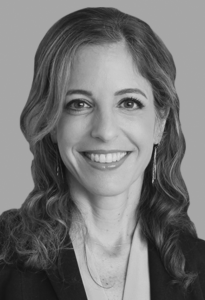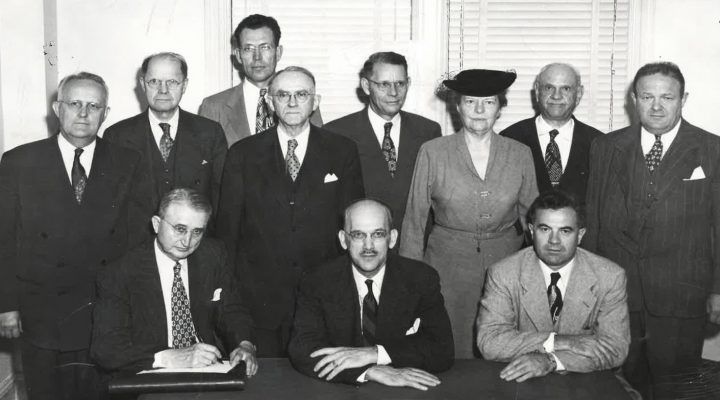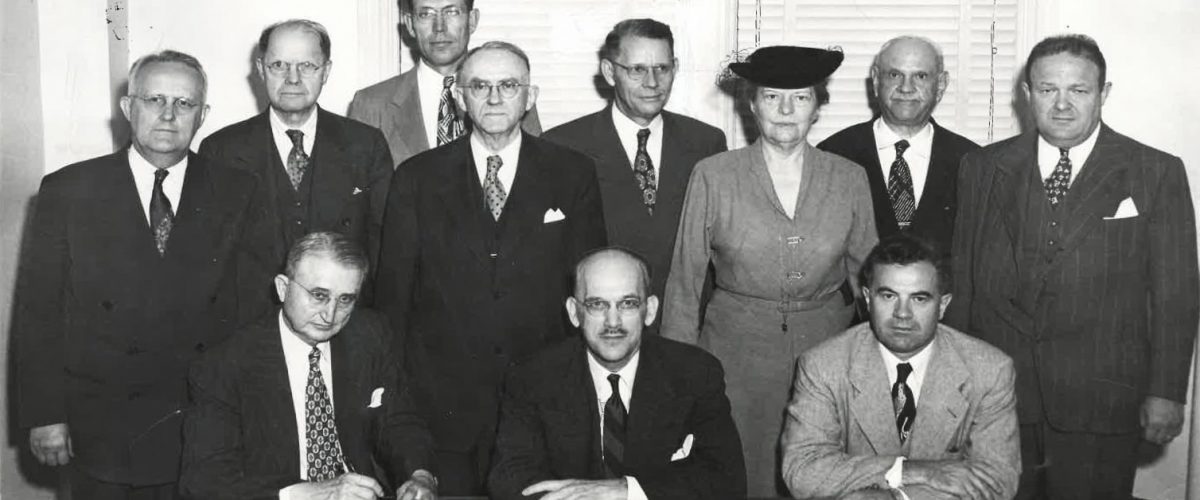In 1947, Baptist, Methodist, Lutheran, Presbyterian, Episcopal and Seventh-day Adventist leaders gathered in Chicago to form a new group: Protestants and Other Americans United for Separation of Church and State.
Founding members included Clyde W. Taylor, secretary of the National Association of Evangelicals, and Louie D. Newton, president of the Southern Baptist Convention. SBC pastor Robbert Maddox later served as the group’s executive director.
But by the 1980s, prominent and politically active evangelical and Southern Baptist leaders went in the opposite direction, waging culture war, enlisting congregations in political activism, and — according to traditional separationists — working to blow up any wall of separation.
But the group founded in 1947 — now known as Americans United for Separation of Church and State — continues the fight 75 years later with the support of religious leaders, even though it has lost the backing of many evangelicals and Southern Baptists.

Rachel Laser
Rachel Laser, AU’s first female and first non-Christian president, grieves the fact that many evangelicals have lost faith in church-state separation.
“It’s a huge loss,” she said. “These groups have done a good job of co-opting what Christianity is all about to oppose church-state separation and to reinforce the myth that church-state separation is anti-Christian or anti-religion.”
Southern Baptists and evangelicals supported separation — until they didn’t
Southern Baptists have supported separation for four centuries, SBC President Bart Barber told TV’s 60 Minutes last year.
In 1939, former SBC president George W. Truett, then pastor of First Baptist Church of Dallas, praised the U.S. Constitution’s insistence that “church and state, in this land, must be forever separate and free, and that neither must ever trespass upon the distinctive functions of the other.”
The SBC formally laid out its support of separation in resolutions on church and state in 1947, 1948, 1963, 1967 and 1968.
- In 1947 it supported a Constitutional amendment spelling out separation more clearly “due to increasing tendencies on the part of state governments and the federal government to circumvent the article of the Constitution written by our Founding Fathers establishing a wall of separation between church and state.”
- In 1948, it announced its support for Protestants and Other Americans United for Separation of Church and State.
- In 1967 it stated: “Church and State should be separate … the church should not resort to the civil power to carry on its work.”
NAE, founded in 1942, committed itself anew to church-state separation during the presidential candidacy of John F. Kennedy, a Catholic. NAE issued a statement in 1959 that praised the Founding Fathers for the “provision for separation of church and state” and promised to “oppose compromise of the historic principle of separation of church and state.”
What changed?
The SBC and NAE never formally reversed these stances, but during the late 1970s and early 1980s, leading members of both groups routinely contravened them, said Rob Boston, who has worked with Americans United since 1987. He wrote a brief history of the organization and edits its magazine, Church & State.

Rob Boston
Boston said Southern Baptists’ about-face on separation accompanied the conservative takeover of the denomination that began in 1979. Meanwhile, the NAE launched its Office of Public Affairs in Washington, D.C., in 1978. The office was led by Robert Dugan Jr., author of Winning the New Civil War. Ronald Reagan spoke twice at NAE conventions, giving his “evil empire” speech in 1983.
This shift on separation was aided by U.S. government, including presidents Bill Clinton, who promoted “charitable choice,” and George W. Bush, whose White House Office of Faith-Based and Neighborhood Partnerships increased funding of faith-based groups. Boston said such programs are “euphemisms for taxpayer funding for religion.”
The shift also was spurred by preference for Protestants. Baptist and evangelicals opposed the mingling of church and state in the 1940s and 1950s when Catholics were doing the mingling but supported it when their evangelical brethren began seeking official support.
President Donald Trump mashed up church and state more than any predecessor, and Southern Baptists and evangelicals rushed to embrace their newfound privilege and funding.
“We used to worry that a true religious zealot would get elected to office and institute The Handmaid’s Tale. But it was Donald Trump.”
“The irony is staggering,” Boston said. “We used to worry that a true religious zealot would get elected to office and institute The Handmaid’s Tale. But it was Donald Trump — who is not exactly known as a towering figure of the Christian faith, is biblically illiterate and never really seemed to have clear religious beliefs he could articulate — who became the champion of Christian nationalism.”
Reversed victories increase urgency
Americans United celebrates “Ten Epic Battles” it won during its first 70 years, including access to birth control, removing state-sponsored prayer and Bible reading from public schools, preventing tax dollars from going to religious schools, and keeping the Ten Commandments out of public institutions.
But these and other victories have since been reversed or fatally weakened, which increases the urgency AU feels now.
AU is now suing to overturn Missouri’s ban on abortion, arguing that legislation based on the religious belief that the “life of each human being begins at conception” is a violation of church-state separation. The plaintiff in Rev. Blackmon v. Missouri is Traci Blackmon, a United Church of Christ minister.
AU also is suing Oklahoma officials who recently approved America’s first tax-supported and faith-based charter school, St. Isidore of Seville Catholic Virtual Charter School. AU is defending faith leaders, public school parents and public education advocates in the case, OKPLAC, Inc. v. Statewide Virtual Charter School Board.
“The biggest driver in my work is believing in America and wanting to keep America America.”
For Rachel Laser, Americans United’s Jewish president, these cases are both personal and political at a time when some Christian groups are part of “a billion-dollar shadow network” that exploits the concept of religious freedom “to turn religious freedom on its head, making it something that gives them religious privilege.”
“Like a lot of Jews, I am grateful this country was able to receive my relatives who were fleeing religious persecution and give them a safe home to thrive in,” she said. “I feel a profound desire to give back to this country.
“For me, the biggest driver in my work is believing in America and wanting to keep America America,” she said. “That means working against “a vocal minority that is raging against the dying of their privilege.”
“I see promoting church-state separation as a way to fight for an inclusive America. That’s what gets me up in the morning.”
While many evangelicals and Baptists have deserted Americans United, it still has the support of many donors and leaders, including board member Brian Kaylor, editor of Word&Way, and David W. Key Sr., director of Baptist studies at Emory University in Atlanta, who is a member of AU’s Faith Advisory Council.
Related articles:
Abortion abolitionist pastor running for state Senate in Oklahoma
Opponents file suit to stop unprecedented Catholic charter school in Oklahoma
Isn’t it really fundamentalist Christian nationalism? | Opinion by Bill Leonard
Truett’s famed religious liberty sermon recreated at D.C. event


